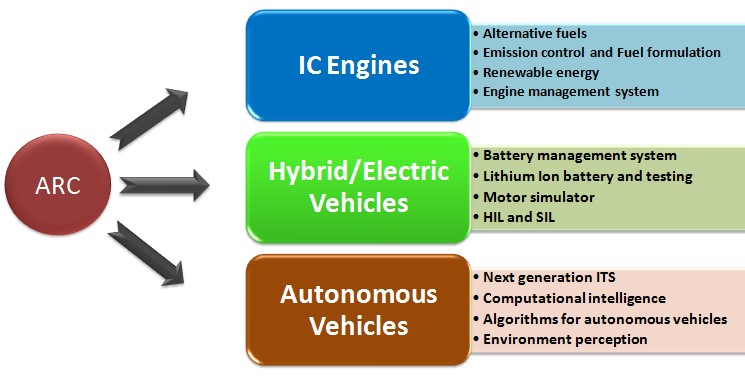Cutting edge technology solutions for future transportation
The major activities of researchers at VIT’s Automotive Research Centre (ARC) are the combustion analysis of internal combustion engines incorporated with advanced engine technologies to achieve an extremely low level of fuel consumption and emission, the development of electric vehicles, and autonomous vehicles to meet the requirements of the eternally increasing energy zone. ARC utilises both experimental and computational approaches to develop an efficient engine operating with the potential to produce higher fuel conversion efficiency in comparison with the conventional power train. Most of the projects elucidate the development of innovative combustion concepts with precise control over fuel injection parameters to meet stringent emission norms. ARC is a derivative of the School of Mechanical Engineering (SMEC). It was established in 2005 with funding of Rs. 56 lakh from DST under the FIST scheme. Till 2016, the centre was supported by the School of Mechanical Engineering. To strengthen the infrastructure and research related to the future direction of the global automotive industry, the centre was separated from the school. Since 2005, ARC has been equipped with facilities worth over Rs. 2.23 crore. The growing Indian automotive industry seeks new technologies to manufacture energy-efficient, less polluting, and cost-effective automobiles. To meet the requirements of the Indian automotive industry, a national-level effort is needed to develop cost-effective newer technologies. ARC is engaged in cutting-edge research in the areas of internal combustion engines, alternative fuels, combustion system development, and engine tribology. Conversely, the Government of India announced more tax benefits to improve the sales of electric vehicles (EVs) to reduce pollution. Also, the development and usage of EVs demand efficient power and traffic management systems. The centre focuses on developing a communication framework for gradable electric vehicles in the power grid and urban cities. In urban cities, intelligent transport systems are mandatory to support smart cities in India. This motivates the centre to develop efficient, intelligent transport systems using computational intelligence techniques. As a whole, the centre contributes to society by saving human lives, promoting energy conservation, being eco-friendly, etc. The Centre of Excellence for Autonomous Vehicles Research was established on November 25, 2019 at VIT, Vellore. The centre is established with world-class laboratory facilities (like high-end deep learning systems and edge computers like DGX1, DRIVE AGX Pegasus, Jetson AGX Xavier, XSens IMU, Velodyne lidars, radars, and cameras) to achieve its aim by partnering with the State University of New York (SUNY) and NVIDIA. The centre aims to develop autonomous vehicles with L5 autonomy using AI-based solutions to mimic human drivers to handle obstacle detection and avoidance, lane keeping, lane changing, traffic sign detection, etc. Furthermore, natural language processing and IoT technologies are used to build interactive human-driven systems for L5 vehicles. Guidance and control algorithms are also developed in the centre to drive the autonomous vehicles in the desired trajectories and routes. The autonomous algorithm developed in the centre is tested in real electric vehicles on VIT test tracks. Hence, the centre works on finding an adequate number of charging stations to support the revolution of electric vehicles in the market.
VITREE - 2024 July Session- Apply Now
Vision
To provide cutting edge technology solutions for future transportation.
Mission
- To provide competitive technologies and products in electric and autonomous vehicles development to meet the requirements of the automotive industry.
- To develop competence for engine development using advanced combustion techniques and fuels such as CNG, hydrogen, methanol, and HCNG.
Major Areas of Expertise


